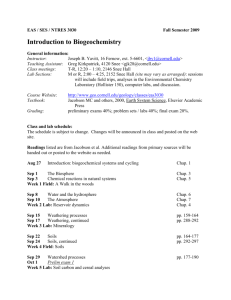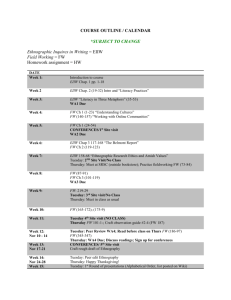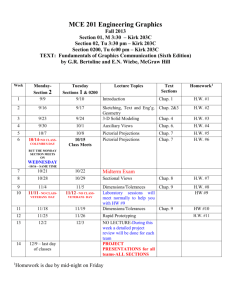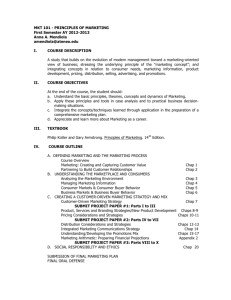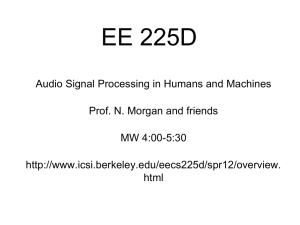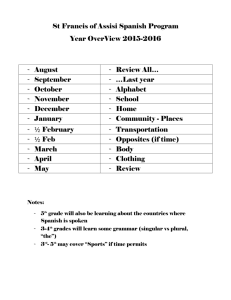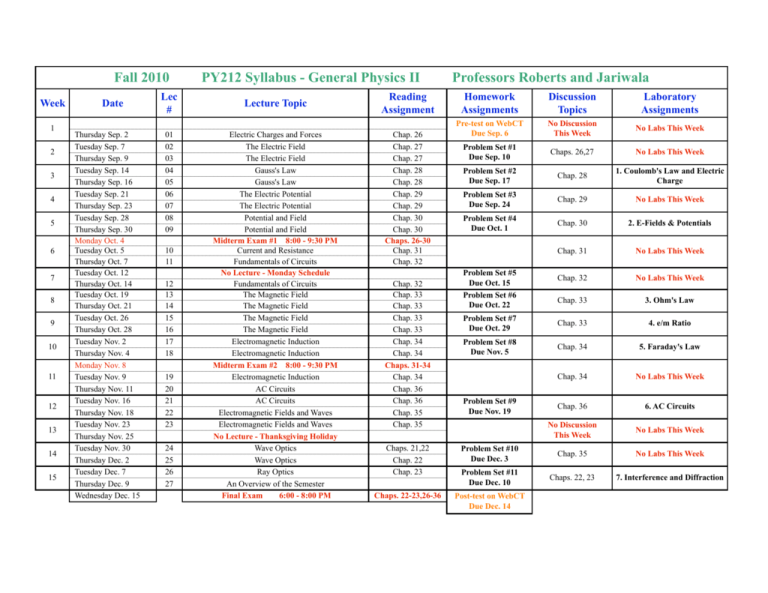
Fall 2010
Week
1
2
3
4
5
6
7
8
9
10
11
12
13
14
15
Date
Thursday Sep. 2
Tuesday Sep. 7
Thursday Sep. 9
Tuesday Sep. 14
Thursday Sep. 16
Tuesday Sep. 21
Thursday Sep. 23
Tuesday Sep. 28
Thursday Sep. 30
Monday Oct. 4
Tuesday Oct. 5
Thursday Oct. 7
Tuesday Oct. 12
Thursday Oct. 14
Tuesday Oct. 19
Thursday Oct. 21
Tuesday Oct. 26
Thursday Oct. 28
Tuesday Nov. 2
Thursday Nov. 4
Monday Nov. 8
Tuesday Nov. 9
Thursday Nov. 11
Tuesday Nov. 16
Thursday Nov. 18
Tuesday Nov. 23
Thursday Nov. 25
Tuesday Nov. 30
Thursday Dec. 2
Tuesday Dec. 7
Thursday Dec. 9
Wednesday Dec. 15
Lec
#
01
02
03
04
05
06
07
08
09
10
11
12
13
14
15
16
17
18
19
20
21
22
23
24
25
26
27
PY212 Syllabus - General Physics II
Lecture Topic
Electric Charges and Forces
The Electric Field
The Electric Field
Gauss's Law
Gauss's Law
The Electric Potential
The Electric Potential
Potential and Field
Potential and Field
Midterm Exam #1 8:00 - 9:30 PM
Current and Resistance
Fundamentals of Circuits
No Lecture - Monday Schedule
Fundamentals of Circuits
The Magnetic Field
The Magnetic Field
The Magnetic Field
The Magnetic Field
Electromagnetic Induction
Electromagnetic Induction
Midterm Exam #2 8:00 - 9:30 PM
Electromagnetic Induction
AC Circuits
AC Circuits
Electromagnetic Fields and Waves
Electromagnetic Fields and Waves
No Lecture - Thanksgiving Holiday
Wave Optics
Wave Optics
Ray Optics
An Overview of the Semester
Final Exam
6:00 - 8:00 PM
Reading
Assignment
Chap. 26
Chap. 27
Chap. 27
Chap. 28
Chap. 28
Chap. 29
Chap. 29
Chap. 30
Chap. 30
Chaps. 26-30
Chap. 31
Chap. 32
Chap. 32
Chap. 33
Chap. 33
Chap. 33
Chap. 33
Chap. 34
Chap. 34
Chaps. 31-34
Chap. 34
Chap. 36
Chap. 36
Chap. 35
Chap. 35
Professors Roberts and Jariwala
Homework
Assignments
Discussion
Topics
Laboratory
Assignments
Pre-test on WebCT
Due Sep. 6
No Discussion
This Week
No Labs This Week
Problem Set #1
Due Sep. 10
Chaps. 26,27
No Labs This Week
Problem Set #2
Due Sep. 17
Chap. 28
1. Coulomb's Law and Electric
Charge
Problem Set #3
Due Sep. 24
Chap. 29
No Labs This Week
Problem Set #4
Due Oct. 1
Chap. 30
2. E-Fields & Potentials
Chap. 31
No Labs This Week
Chap. 32
No Labs This Week
Chap. 33
3. Ohm's Law
Problem Set #7
Due Oct. 29
Chap. 33
4. e/m Ratio
Problem Set #8
Due Nov. 5
Chap. 34
5. Faraday's Law
Chap. 34
No Labs This Week
Chap. 36
6. AC Circuits
No Discussion
This Week
No Labs This Week
Problem Set #5
Due Oct. 15
Problem Set #6
Due Oct. 22
Problem Set #9
Due Nov. 19
Chaps. 21,22
Chap. 22
Chap. 23
Problem Set #10
Due Dec. 3
Chap. 35
No Labs This Week
Problem Set #11
Due Dec. 10
Chaps. 22, 23
7. Interference and Diffraction
Chaps. 22-23,26-36
Post-test on WebCT
Due Dec. 14
Professor B. Lee Roberts
Professor Manher Jariwala
Office: PRB 373
Phone: (617) 353-2187
E-mail: roberts@bu.edu
Office: PRB 251
Phone: (617) 353-5766
E-mail: manher@bu.edu
PY212 – GENERAL PHYSICS II
PHYSICS 212 is a calculus-based course covering the principles of electricity, magnetism,
and electromagnetic waves. Topics include: the electric field and potential, current and
resistance, the magnetic field, electromagnetic induction, DC and AC circuits, the
electromagnetic field and waves, and wave and ray optics. The course emphasizes both the
conceptual understanding of these fundamental principles of physics and the development of
the calculational skills needed to apply these principles in practice.
PY212 Course Organization Fall 2010
Lectures
Section A1
Section B1
Section C1
T, Th 8:00AM – 9:30AM
T, Th 2:00PM – 3:30PM
T, Th 5:00PM – 6:30PM
SCI 115 Professor Roberts
SCI 107 Professor Jariwala
SCI 115 Professor Jariwala
All exams, homework assignments, and labs are the same for all sections. The three sections
are graded as a single class according to the criteria given below.
Course Prerequisites
Completion of one semester of college calculus equivalent to the BU course MA124 is a
prerequisite for the course. Please inform the instructor if this prerequisite has not been met
so that you may be rescheduled into an appropriate course. In addition, you should now be
taking the co-requisite calculus course MA225 (multivariate calculus). It is very important
that these math requisites are met in order to ensure successful completion of PY212.
1
Textbooks
Physics for Scientists and Engineers: A Strategic Approach, 2nd Edition (2008)
Randall D. Knight
• Volume 3 (Chapters 20-25), ISBN-13: 9780321516640 (softbound, packaged bundle)
• Volume 4 (Chapters 26-36), ISBN-13: 9780321516657 (softbound, packaged bundle)
Pearson Addison-Wesley (San Francisco, CA)
The textbooks are available at the BU bookstore and from various online sources. The
bookstore versions are packaged bundles of the each volume with a student workbook and a
code for MasteringPhysics <http://masteringphysics.com>, an online homework service.
Please note that both Volumes 3 and 4 (covering Ch. 20-36) are required for this semester.
TurningPoint Response Card RF (“Clicker”)
TurningPoint Response Card RF 02, ISBN-13: 9781934931394
Turning Technologies (Youngstown, OH)
The TurningPoint response card RF is also available at the BU bookstore at the clicker desk.
These are new clickers that are being adopted across the entire BU Charles River campus.
Importantly, these are the NOT the same ones used previously in CH101/102, in PY105/106,
or in PY211. We will be assigning a part of your overall grade to class participation using
the clickers in class, so please bring your clicker with you to each lecture meeting.
Course Syllabus
The course will first cover Vol. 4 (Chapters 26-36) of the textbook, followed by selected
sections from Vol. 3 (Chapters 20-25). The detailed schedules of lectures, labs, exams and
homework assignments are given on the course syllabus posted on WebCT. Due dates of all
assignments given in the syllabus are firm and will not be extended.
Pre-lectures and Pre-flights
Pre-lecture videos and pre-flight quizzes for almost every lecture will be posted at
http://physicsbrain.com. Please complete the assigned module by 7am of the day of lecture.
Completing the quizzes allows us to tailor our lectures appropriately, as well as prepares you
for a more detailed discussion of the topics in class. A part of your grade will be based on
successfully completing all of the pre-lectures and pre-flight quizzes.
Lectures
Attendance at all lectures is required. In lecture, we will focus on developing a conceptual
understanding of the material as well as mathematical problem solving, using a variety of
active learning methods. To get the most out of lecture, please read in advance the chapter to
be covered. A reading quiz will be given at the beginning of each class.
Course Web Site http://webct.bu.edu
To access the course website, start at http://webct.bu.edu, select My WebCT at the right of the
screen or find the combined course title for CAS PY212. To login, use your regular BU login
user name and Kerberos password. This web site will contain all the course information and a
variety of useful physics resources. You will also be able to view your grades, teaching
fellow and office hour information, homework assignments and solutions, etc.
2
Homework
We are using a combination of traditional, turned-in homework and online homework, using
the MasteringPhysics service bundled with your textbook. There will be a homework
assignment given nearly every week of the semester that is not interrupted by a break. Paperbased homework sets are to be submitted in the boxes located in the basement of the Metcalf
Science Center. Online homework sets are to be completed at http://masteringphysics.com.
You may work together to start a problem, but the work you submit must be your own.
Please remember that homework is the best preparation you have for the course exams. You
may obtain help from PY212 teaching fellows in the undergraduate resource room (SCI-121)
during their posted hours. Outside of office hours, please use the email account below for
homework questions. The due dates of all problem sets are given on the syllabus.
Generally, assignments are due Fridays at 5:00 PM.
Special Email Account
For questions about homework, please send email to py212@physics.bu.edu. Here the
PY212 Teaching Fellows will attempt to answer you questions in a timely manner. For
quicker response, please use the subject line in your email to indicate the specific question.
Calculator
A scientific calculator with trigonometric and exponential functions and their inverses will be
needed for homework calculations; however, calculators will not be allowed on any exams.
Discussion Sessions and Quizzes
Discussion sections are a required part of the course. The discussion sessions will be
conducted in hour-long sections that meet each week except as noted in the syllabus. A
Teaching Fellow (TF) will lead the class discussion on the current week’s material. You will
also be able to ask your TF for general help or hints with your assigned homework problems.
The discussion sessions provide an opportunity to work through more difficult concepts in an
informal setting, with the expert guidance of a Teaching Fellow. A quiz based on the current
week’s homework set will be given during each discussion period. You must work
individually to complete the exercise, which should then be returned to your TF for grading.
Laboratory Sessions and Reports
Laboratory sections are a required part of the course. The schedule of lab experiments for
the course is included in the syllabus. The complete information about all of the labs is
available at http://physics.bu.edu/ulab/all_labs.html. You will need to print the PDF file of
the write-up for the assigned lab yourself since no hardcopies will be provided. Be sure to
complete the pre-lab worksheet prior to going to lab since some use online simulations.
During each 3-hour lab session, you are expected to perform the experimental measurements,
analyze the data, and write the lab report. The lab reports may be written on loose leaf paper
of your choice, i.e., no lab book is required. Since these reports are to be turned in to your
laboratory teaching fellow at the end of your lab session, you should prepare as much of the
lab report as possible before coming to your lab session. The physics teaching laboratory
rooms are located along the B1 – B25 corridor in the basement of SCI and in rooms SCI-134
and SCI-136. The room assignments for each lab will change from week to week. Please
check the location of your lab each week on the schedule posted on each lab door and on the
PY212 Bulletin Board. You must complete all seven labs, during the weeks they are
assigned. No labs will be “dropped”. There are no scheduled makeup labs.
3
Lab Report Format
Title of experiment and your name, ID#, TF, and lab partner.
Introduction/Theory: Write your own brief paragraph summarizing the objectives of the
experiment, including physical principles, theory, and concepts involved.
Experimental Setup/Procedures: Write a brief paragraph describing the apparatus and the
specific techniques being used to perform the experiment. Discuss how you actually made
the measurements.
Data Analysis, Graphs, and Tables: Prepare the basic equations and tables that you will need
in order to perform the calculations required to analyze your data. This part should be well
organized so that you can clearly tabulate your final answers in your report.
Conclusions: Write a brief paragraph summarizing the results and conclusions derived from
your data. Be sure that your conclusions are supported by your data. Discuss any
inconsistencies between your result and what you expected to be the outcome of the
experiment.
Questions: Answer the questions listed in the lab write-up. Your TF may modify some of the
required questions. These changes will be announced during the lab introduction.
Midterm and Final Exams Dates
Two midterm exams will be given out of class on the following dates:
Midterm #1 – Monday, October 4, 8:00 – 9:30 PM
Midterm #2 – Monday, November 8, 8:00 – 9:30 PM
The combined section final exam date, as set by the Registrar’s Office, is:
Final Exam – Wednesday, December 15, 6:00 – 8:00 PM
Please reserve these dates on your calendar since there will be no makeup exams.
Course Grade
Your letter grade for the course will be assigned on the basis of the total score you
accumulate throughout the course. Each factor will contribute as follows:
Homework, Quizzes, Pre-flights, Clicker Questions
Lab Reports
Midterm #1
Midterm #2
Final Exam
20%
15%
20%
20%
25%
Academic Conduct
Students enrolled in this course are expected to follow the Boston University Student Code of
Academic Conduct for all assignments and exams. Violations of the code must be and will
be reported to the Dean’s office. For more information, please visit the following website:
http://www.bu.edu/cas/academics/programs/conductcode.html.
4



